|

福德法幢劉銳之金剛上師、移喜泰賢金剛上師合照(1984年)
Guru Lau Yui-che Yeshe Thaye
1984 (Hong Kong) |
|
蓮花海 第 41 -- 50 期
簡介
Lake
of Lotus Issue 41-50
Short
Introduction
.jpg)
|


















 |
|
第四十一期 Issue 41
Sept 2012
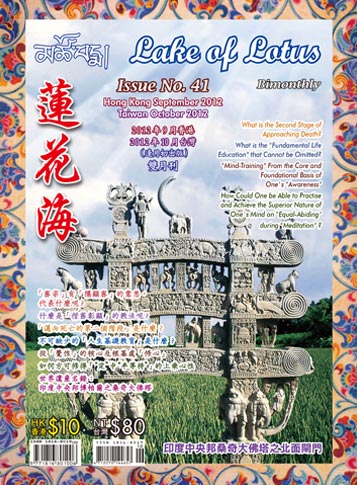
|
第四十一期 Issue 41
-
「密宗」有「隱顯密」的意思,代表什麼呢?
-
什麼是「借密彰顯」的教法呢?
-
「邁向死亡的第二個階段」是什麼?
-
不可缺少的「人生基礎教育」是什麼?
-
從「覺性」的核心及根基處「修心」
-
如何方可修得「“定”中“平等持”」的上乘心性
-
世界遺產名錄:印度中央邦博帕爾之桑奇大佛塔
-
What is the
Second Stage of Approaching Death?
-
What is the “Fundamental Life
Education” that Cannot be Omitted?
-
“Mind-Training”
From the Core and Foundational Basis of One’s “Awareness”
-
How Could One be Able to
Practise and Achieve the Superior Nature of One’s Mind on
“Equal-Abiding” during “Meditation”?





 |
|
第四十二期 Issue 42
Nov 2012
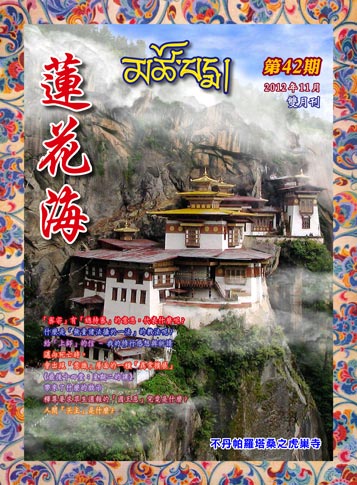
|
第四十二期 Issue 42
-
「密宗」有「總持密」的意思,代表什麼呢?
-
什麼是「無量諸法攝於一法」的教法呢?
-
給「上師」的信–我的修行感想與祈請
-
邁向死亡時,會出現「意識」層面的一種「異常擴展」
-
《最後十四堂:星期二的課》帶來了什麼的啟示
-
釋尊要求眾生還報的「國王恩」究竟是什麼?
-
人間「天主」是什麼?
-
A Kind of
“Anomalous Expansion” that Developed in One’s
“Consciousness” when Approaching Death
-
Revelations from the “Tuesdays
with Morrie”
-
What is Actually
the “Gratitude to the King” That Needs To Be Repaid by
Sentient Beings as Requested by the Lord Buddha?
-
What Are the “Heavenly Gods” in
the Human World?





 |
|
第四十三期 Issue 43
Jan 2013
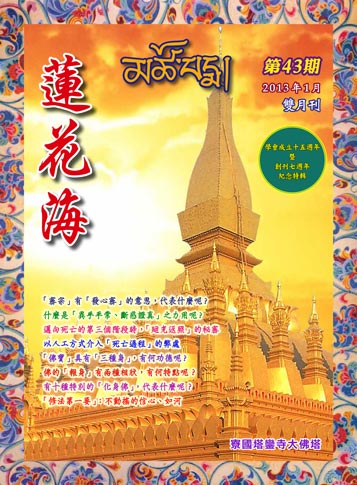
|
第四十三期 Issue 43
-
「密宗」有「發心密」的意思,代表什麼呢?
-
什麼是「異乎平常、斷惑證真」之力用呢?
-
邁向死亡的第三個階段時,「廻光返照」的祕密
-
以人工方式介入「死亡過程」的弊處
-
「佛寶」具有「三種身」,有何功德呢?
-
佛的「報身」有兩種相狀,有何特點呢?
-
有十種特別的「化身佛」,代表什麼呢?
-
「修法第一要」:不動搖的信心、如河
-
The Secret of “Flash-back” during the
Third Stage of Approaching Death
-
Disadvantages of
Artificial Intervention in the “Dying Process”
-
The “Buddha Jewel” has “Three Bodies”.
What are Their Merits?
-
The “Sambhogabaya
(Enjoyment Body)” of A Buddha has Two Forms. What are
Their Characteristics?
-
What do the Ten Kinds of
Special “Manifested Body of A Buddha” Represent?





 |
|
第四十四期 Issue 44
Mar 2013
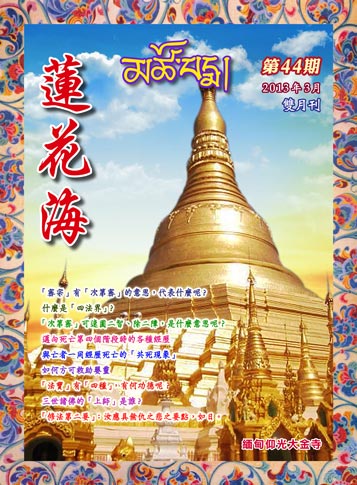 |
第四十四期 Issue 44
-
「密宗」有「次第密」的意思,代表什麼呢?
-
什麼是「四法界」?
-
「次第密」可速圓二智、除二障,是什麼意思呢?
-
邁向死亡第四個階段時的各種經歷
-
與亡者一同經歷死亡的「共死現象」
-
如何方可救助嬰靈
-
「法寶」有「四種」,有何功德呢?
-
三世諸佛的「上師」是誰?
-
「修法第二要」:汝應具無仇之悲之要點,如日。
-
Various Adventures While
Progressing towards the Fourth Stage of Death
-
“Sharing Death Experiences”with the
Deceased Person
-
How to Help the Spirits
of the Unborn Fetus
-
There are “Four Kinds” of “Dharma
Jewel”. What are Their Merits?
-
Who Are the “Gurus” of
the Various Buddhas of the Worlds of the Three Times?





 |
|
第四十五期 Issue 45
May 2013
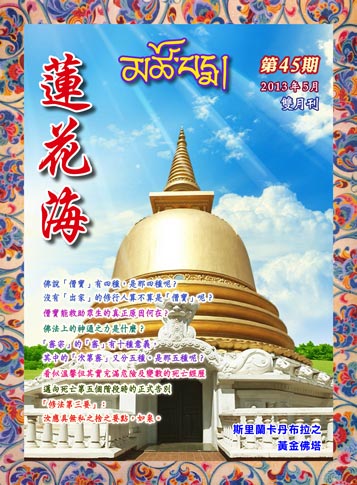
|
第四十五期 Issue 45
-
佛說「僧寶」有四種,是那四種呢?
-
沒有「出家」的修行人算不算是「僧寶」呢?
-
僧寶能救助眾生的真正原因何在?
-
佛法上的神通之力是什麼?
-
「密宗」的「密」有十種意義,其中的「次第密」又分五種。是那五種呢?
-
看似溫馨但其實充滿危險及變數的死亡經歷
-
邁向死亡第五個階段時的正式告別
-
「修法第三要」:汝應具無私之捨之要點,如泉。
-
The Actual
Departure When Approaching the Fifth Stage of Death
-
The Seemingly Touching, but Filling With Risks and Variations In
Actuality, Process of Death
-
The Lord Buddha Said That There Are Four Kinds of “Sangha
Jewel”. What Are They? Are Those Dharma Practitioners Not
Undergoing “Pabbajja” To Be Regarded As The “Sangha Jewel”?
-
What Are The Real Reasons For The “Sangha Jewel” To Be Able To
Save And Assist Sentient Beings?
-
What Are The Supernatural Powers in The Buddha Dharma?






|
|
第四十六期 Issue 46
July 2013
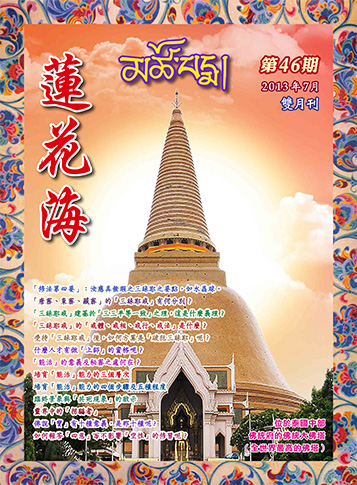 |
第四十六期 Issue 46
-
「修法第四要」:汝應具無瑕之三昧耶之要點,如水晶球。
-
「唐密、東密、藏密」的「三昧耶戒」有何分別?
-
「三昧耶戒」建基於「三三平等一致」之理,這是什麼義理?
-
「三昧耶戒」的「戒體、戒相、戒行、戒法」是什麼?
-
受持「三昧耶戒」後,如何方算是「破犯三昧耶」呢?
-
什麼人才有做「上師」的資格呢?
-
「能治」的意義及秘密之處何在?
-
培育「能治」能力的三個層次
-
培育「能治」能力的四個步驟及五種程度
-
臨終景象與「共死現象」的啟示
-
靈界中的「拐騙者」
-
佛說「寶」有十種意義,是那十種呢?
-
如何報答「四恩」而不影響「空性」的修習呢?
-
The Lord Buddha Said That “Jewels” Have Ten Kinds of Meanings.
What Are They?
-
How Could One Repay the “Four Kinds of Gratitude” Without
Affecting One’s Dharma Practice On “Emptiness”?
-
Scenes at Death and
Revelation of Sharing Death Experiences
-
Abductor in the Spiritual World





 |
|
第四十七期 Issue 47
Sept 2013
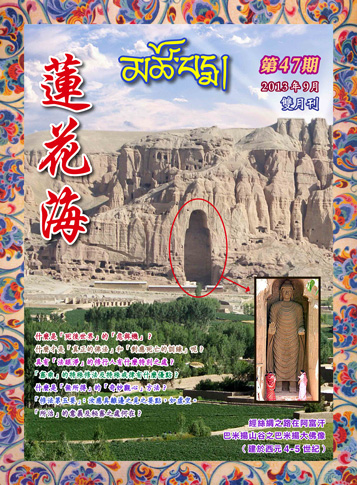 |
第四十七期
Issue 47
-
什麼是「死後世界」的「危與機」?
-
什麼才是「真正的佛法」和「對應死亡的訓練」呢?
-
具有「法眼淨」的修行人有什麼特別之處?
-
「密乘」的特殊修法及特殊戒律有什麼優點?
-
什麼是「無所得」的「奇妙觀心」方法?
-
「修法第五要」:汝應具離邊之見之要點,如虛空。
-
「所治」的意義及秘密之處何在?
-
What Are The “Non-Attaining” Methods For “Wonderful Mental
Visualization”?
-
What Are The Characteristics of Dharma Practitioners Endowed
with The “Clarity of Dharma Eyes”?
-
What
are the “Risks and Opportunities” in the “Posthumous World”?
-
What are the “Genuine Buddhism” and Its “Corresponding Training
on Death”?






|
|
第四十八期 Issue 48
Nov 2013
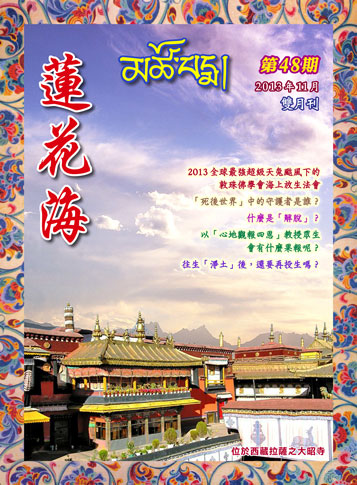 |
第四十八期 Issue 48
-
2013
年全球最強超級颱風下的敦珠佛學會放生大法會
-
「死後世界」中的守護者是誰?
-
什麼是「解脱」?
-
以「心地觀報四恩」教授眾生會有什麼果報呢?
-
往生「淨土」後,還要再投生嗎?
-
蓮師八變(八)
之多傑卓洛(2)
-
「綠度母」的奇妙功德
(15)
-
印度中央邦博帕爾之桑奇大佛塔
(8)
-
Who are the
Protectors in the “Posthumous World”?
-
What is Meant by
“Liberation”?
-
What Are the
Fruitions of Requital in Teaching Sentient Beings the “Mind
Ground Visualization on the Requital of the Four Kinds of
Gratitude”?
-
Would
One Still Be Reborn Again After Entry Into the “Pure Land”?
-
Dudjom Buddhist Association’s Life-Freeing Ceremony Conducted
Miraculously As Usual Without the Slightest Sea Waves Under One
of the Strongest “Super Typhoon Usagi” in 2013
 




|
|
第四十九期 Issue 49
Jan 2014
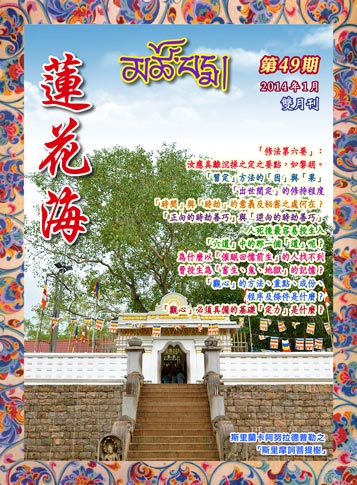
|
第四十九期 Issue 49
-
「修法第六要」:汝應具離沉掉之定之要點,如黎明。
-
「習定」方法的「因」與「果」
-
「出世間定」的修持程度
-
「時間」與「時劫」的意義及秘密之處何在?
-
「正向的時劫善巧」與「逆向的時劫善巧」
-
人死後最容易投生入「六道」中的那一個「道」呢?
-
為什麼以「催眠回憶前生」的人找不到曾投生為「畜生、鬼、地獄」的記憶?
-
「觀心」的方法、重點、成份、程序及條件是什麼?
-
「觀心」必須具備的基礎「定力」是什麼?
-
To Which One of the “Six Realms”
will a Human Most Easily Be Reborn After One’s Death?
-
Why Those with
“Hypnotized Memories of Past Lives” Cannot Find Memories of
Having Been Reborn into “Realms of Animals, Ghosts and Hells”?
-
What
Are The Methods, Focus, Composition, Process and Conditions for
“Mental Visualization”?
-
What Are The Foundational “Concentration Powers” One Must Have
for “Mental Visualization”?
 



 |
|
第五十期 Issue 50
Mar 2014
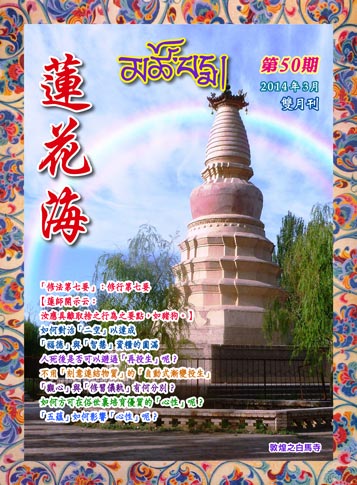 |
第五十期 Issue
50
-
如何對治「二空」以達成「福德」與「智慧」資糧的圓滿。
-
人死後是否可以避過「再投生」呢?
-
不用「刻意連結物質」的「自動式漸變投生」
-
「觀心」與「修習儀軌」有何分別?,如何方可在俗世裏培育優質的「心性」呢?
-
「五蘊」如何影響「心性」呢?
-
「修法第七要」:【蓮師開示云:汝應具離取捨之行為之要點,如豬狗。】
-
Can
“Rebirths” be Avoided After One’s Death?
-
“Automatic & Gradual
Transforming Patterns of Rebirths” Without “Purposely Linked
to Materials”
-
What
Are the
Differences Between "Mental Visualization" and "Sadhana
Practices"?
-
How
Can One Nurture High Quality of One’s “Nature of Mind” in
the Mundane World?
-
How Do The
“Five Aggregates (Panca-Skandhas)”
Influence One’s “Nature of The Mind”?






|
Create your free online surveys with SurveyMonkey , the world's leading questionnaire tool. |

.jpg)









